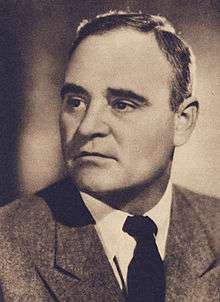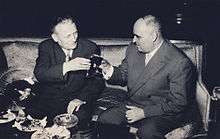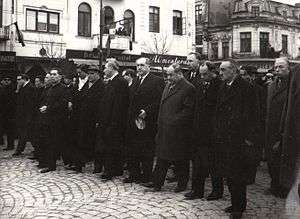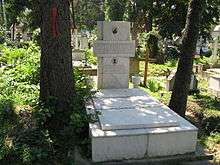Gheorghe Gheorghiu-Dej
| Gheorghe Gheorghiu-Dej | |
|---|---|
 | |
| General Secretary of the Romanian Communist Party | |
|
In office 1944 – 1954 1955 – March 19, 1965 | |
| Preceded by |
Ștefan Foriș (1944) Gheorghe Apostol (1955) |
| Succeeded by |
Gheorghe Apostol (1954) Nicolae Ceaușescu (1965) |
| President of the State Council | |
|
In office March 21, 1961 – March 19, 1965 | |
| Preceded by |
Ion Gheorghe Maurer (as President of the Presidium of Great National Assembly) |
| Succeeded by | Chivu Stoica |
| Prime Minister of Romania | |
|
In office June 2, 1952 – October 2, 1955 | |
| Preceded by | Petru Groza |
| Succeeded by | Chivu Stoica |
| Personal details | |
| Born |
November 8, 1901 Bârlad, Romania |
| Died |
March 19, 1965 (aged 63) Bucharest, Romania |
| Nationality | Romanian |
| Political party | Communist Party of Romania |
| Spouse(s) | Maria Alexe |
Gheorghe Gheorghiu-Dej (Romanian pronunciation: [ˈɡe̯orɡe ɡe̯orˈɡi.u deʒ]; November 8, 1901 – March 19, 1965) was the communist leader of Romania from 1947 until his death in 1965.
Early life
Gheorghe was the son of a poor worker from Bârlad,[1] Tănase Gheorghiu, and his wife Ana.
Worker and union organizer
Poverty made him leave school early and start working at the age of 11.[1] Due to his age and lack of professional training, he often changed his job, eventually settling to be an electrician.[1] Working at a factory in Comănești, he joined the workers' union and participated in the 1920 Romanian general strike, during which all the participants were dismissed.[1]
A year later, he was hired as an electrician at the Galați tramway company, where he was also fired for organizing protests against the 9-hour workday and for higher wages.[1] He was later hired by the Romanian Railways workshops in Galați.[2]
As the Great Depression began eroding the already low living standards of the workers, Gheorghiu-Dej began to be more politically active, joining the Communist Party of Romania in 1930.[2] He was assigned to organize agitation in the Romanian Railways workshops in Moldavia.[2]
On August 15, 1931, Gheorghiu was accused of "communist agitation" and punitively moved to Dej, a town in Transylvania, where he continued the union activity.[2] The union presented a petition in February 1932 to the Romanian Railways, demanding better working conditions and higher wages. As a response, the Romanian Railways closed down the Dej and fired all the workers, including Gheorghiu, who was deprived with the right to be hired by any other Railways workshop.[3]
Activist
It was during this era that Gheorghiu got his Gheorghiu-Dej moniker by the Siguranța (secret police), who did it to differentiate him from the other union leaders called Gheorghiu.[3] After his dismissal from the Railways workshop, Gheorghiu was very active in organizing the unions and coordinating the workers of Iași, Pașcani and Galați.[4]
On the night of 14/15 July 1932, he was arrested for placing "subversive posters on the walls and poles of Giulești Road", being held in the Văcăreşti prison.[5] Defended by lawyer Iosif Schraier, he was freed because the posters were related to the elections and this was during the electoral campaign for the Romanian general election, 1932.[5]
Gheorghiu-Dej was briefly arrested again on October 3, 1932 at the end of a workers' meeting in Iași after he urged the workers to "unite to fight against the capitalist class" on alleged charges of having hit a police commissioner.[6] He was freed as the charges were found to be false.[6]
In January 1933, the Romanian Government announced some even more stringent austerity measures which included new wage cuts. This led to the radicalization of the workers.[7] Gheorghiu-Dej, together with union president Constantin Doncea, led the Bucharest workers to strike during what became known as the Grivița Strike of 1933.[7]
As the negotiations failed, the government feared a general strike, so it declared a state of siege in Bucharest and other cities.[8] Gheorghiu-Dej was arrested during the night of February 14/15, 1933.[9]
In prison
Gheorghiu-Dej was sentenced to prison in the same year by a military court,[10] serving time in Doftana and other facilities. In 1936 he was elected to the party's Central Committee and became leader of the prison faction of the party (party members who were incarcerated, a term distinguishing them from party members living in exile in the Soviet Union).
As a known activist, he was detained at Târgu Jiu camp during Ion Antonescu's regime and most of World War II, liberated in August 1944. He became general secretary in 1944 after the Soviet occupation but did not consolidate his power until 1952 when he purged Ana Pauker and the Muscovite faction from the party. Pauker had been the unofficial leader of the Party since the end of the war.
In 1946-1947, he was a member of Romania's Gheorghe Tătărescu-led delegation to the Paris Peace Conference.
In power
Under Soviet directives
On 30 December 1947, Gheorghiu-Dej and Prime Minister Petru Groza forced King Michael to abdicate. Years later, the First Secretary of the Party of Labour of Albania, Enver Hoxha alleged that Gheorghiu-Dej personally pulled a gun on Michael and threatened to kill him unless he gave up the throne.[11]
Soviet influence in Romania under Joseph Stalin favored Gheorghiu-Dej, largely seen as a local leader with strong Marxist-Leninist principles. The economic influence of the Soviet Union was highlighted by the creation of the SovRom companies, which directed Romania's commercial exchanges towards unprofitable markets.
Up until Stalin's death and even afterwards, Gheorghiu-Dej did not amend repressive policies (such as the works employing penal labor on the Danube-Black Sea Canal - a Stalinist Gulag-type decision which he had countersigned). On the orders of Gheorghiu-Dej Romania implemented massive forced collectivization of land in the rural areas. At the same time, he was the main instigator of the assassination of Ștefan Foriș in 1946 and the arrest of Lucrețiu Pătrășcanu in 1948 - both of whom had been his rivals inside the Party's leadership.
Personal rule
.jpg)
Gheorghiu-Dej briefly gave up the first secretaryship of the Communist Party in 1954 to Gheorghe Apostol, retaining the premiership he had held since 1952. However, he was still the actual leader of Romania, and he regained the party leadership in 1955. In 1961, he became president of the newly created State Council, making him de jure head of state. He was already de facto head of state by virtue of his party post.
Gheorghiu-Dej was at first unsettled by Nikita Khrushchev's reforms and the process of De-Stalinization. He then became the architect of Romania's semi-autonomous foreign and economic policy within the Warsaw Pact and the Comecon in the late 1950s, notably by initiating the creation of a heavy industry which went against Soviet directions for the Eastern Bloc as a whole (e.g. the new large-scale steel plant in Galați, which relied on iron resources imported from India and Australia). Ironically, Romania under Gheorghiu-Dej was once considered one of the most loyal among the Soviet satellites, and thus there is a tendency to forget "who first established the pattern of foreign policy openness and 'liberalness' coupled with domestic repression."[12]
The ideological steps undertaken were made clear by the ousting of the SovRoms, together with the toning down of Soviet-Romanian common cultural ventures. In 1958 the Red Army withdrew its last troops from Romania. The official History of Romania made reference to a Romanian Bessarabia, as well as other topics which tensed relations between the two communist countries. Moreover, the final years of the regime saw the publishing of Karl Marx texts, which had previously been kept secret, dealing with Russia's imperial policy in previously Romanian regions that were still part of the Soviet Union.
But the Securitate was still Dej's instrument of choice,[13] and Romania joined the wave of repression after the 1956 Hungarian Revolution - incidentally, Hungarian leader Imre Nagy was shortly detained on Romanian soil.
In his late years, Gheorghiu-Dej established diplomatic relations with the First World, including the United States. Such steps were highly encouraged by the president Lyndon B. Johnson, who had come to see Romania as an almost friendly Communist country in the Cold War context (1963). 1964 was the year many political prisoners were released.
Interaction with the West
In the early years of Gheorghiu-Dej’s rule Romania’s relations with the West were tense, marked by accusations of United States espionage and Romanian human rights violations. There were also low levels of trade between Romania and the West as Romania tied itself to the Soviet Union and the other satellite nations; in 1950, Romania’s economic plan involved 89% of trade to be solely with the Soviet Bloc.

Later, however, Romania’s willingness to trade with the West became more apparent. For example, 1952 saw the first publication of the journal Romanian Foreign Trade, which offered opportunities to Western traders to buy Romanian goods such as petroleum and grain. Western publications also recognized the potential for Romania to sell its products on the world market; an article from The Times of August 29, 1953, wrote: “[Romania] could, for instance, it is thought, obtain higher prices on the world market for much of what she is forced to export to Russia, foodstuffs included, in return for machinery and aid.” As Gheorghiu-Dej realized, if Romania were able to trade with the West the standard of living would likely rise.
From 1953, the West gradually relaxed their export controls, which had limited the products that the U.S., Great Britain, and France could export to Eastern Europe. Gheorghiu-Dej, eager to establish interaction between Romania and the West, relaxed travel restraints on Western diplomats in Bucharest and allowed Western journalists more access to Romania. In early 1954, Romania also appealed to Great Britain about having talks to resolve Romania’s outstanding claims, to which Great Britain agreed in December of that year.
Romania's foreign policy towards the West was closely tied to its policy toward the Soviet Union; Romania could only develop trading with the West if it asserted its independence from the intensely anti-West Soviet Union. Gheorghiu-Dej realized this, and thus emphasized Romania’s sovereignty. In the Second Party Congress which opened on December 23, 1955, Gheorghiu-Dej gave a five-hour speech in which he stressed the idea of national communism and Romania’s right to follow its own interests rather than be forced to follow another’s (referring to the Soviet Union). Gheorghiu-Dej also discussed opening up trade with the West. In an attempt to increase the dialogue between Romania and the West, in 1956 Gheorghiu-Dej instructed the new ambassador to the U.S. to meet with both Secretary of State John Foster Dulles and then with President Dwight D. Eisenhower. As a result of these meetings, the U.S. Department of State expressed interest in increasing the interaction between the two nations, including possibly establishing a library in Bucharest.
Romania’s interaction with the West temporarily decreased, however, with the 1956 Hungarian Revolution and the violent response of the Soviet Union to the uprising. Still, Gheorghiu-Dej continued to strengthen the independence from the Soviet Union. For example, Romanian schools dropped the Russian language requirement. And, obviously, Romania endorsed the Moscow Declaration of 1957 which stated that "Socialist countries base their relations on the principles of complete equality, respect for territorial integrity, state independence and sovereignty, and non-interference in one another’s affairs…The socialist states also advocate the general expansion of economic and cultural relations with all other countries…” These statements coincided with Gheorghiu-Dej’s claims to national sovereignty and independence.
In fact, by 1957 Romania had substantially increased its Western trade; in that year trade with the West had increased to 25% of Romania’s total trade. By the early 1960s, Romania under Gheorghiu-Dej was more industrialized and productive. After World War II 80% of the population had worked in agriculture, but by 1963, 65% did. And despite the decrease in hands working the land, agricultural productivity had actually increased. Additionally, Gheorghiu-Dej had successfully begun a strong shift in trade towards the West, further separating it from the Soviet Union; Romania imported much of its industrial equipment from West Germany, Great Britain, and France. This trade pattern followed Gheorghiu-Dej’s economic plan, which he made clear to Great Britain and France in 1960, when he sent his head of foreign intelligence to Paris and London in order to clarify Romania’s desire to interact with the West and disregard Comecon orders.
By 1964 Gheorghiu-Dej had made a trading agreement with the U.S. that allowed Romania to buy industrial products from them. The agreement came as a result of U.S. businesses’ complaints that they were losing money to Western Europe. During his presidency, President John F. Kennedy, concerned with these businesses’ losses, used his powers to increase trade between the U.S. and Eastern Europe, a policy which President Lyndon Johnson also followed.
Thus, Gheorghiu-Dej greatly increased trade with the West, making Romania the first Soviet Bloc country to trade with the West completely independently. Through his policy of national sovereignty, Gheorghiu-Dej increased the popularity of Romania in the West; national U.S. publications moved away from reports in the early 1950s of human rights abuses and oppression, towards articles from the mid-1950s to the early 1960s of Romanian de-satellization. In the early 1960s, The Times also reported often on Gheorghiu-Dej’s and Romania’s increased economic ties with the West. Gheorghiu-Dej’s successful efforts to expand Romania’s foreign relations, especially those with the West, were evident at his March 1965 funeral, attended by 33 foreign delegations, including a special French envoy sent by General Charles de Gaulle. Gheorghiu-Dej’s policies set the stage for his successor, Nicolae Ceaușescu, to carry Romania’s new course even further.
Death and legacy



Gheorghiu-Dej died of lung cancer in Bucharest on March 19, 1965. Gheorghe Apostol has claimed that he had been appointed successor by Gheorghe Gheorghiu-Dej himself - in any case many perceived him as such in 1965. But prime-minister Ion Gheorghe Maurer, who had developed a hostility towards Apostol, made sure that he was prevented from gaining power, rallying the Party leadership around Nicolae Ceaușescu - a long-time protégé of Gheorghiu-Dej. Securitate general Ion Mihai Pacepa, who defected to the United States in 1978, wrote that Ceaușescu had allegedly told him about "ten international leaders the Kremlin killed or tried to kill"; Gheorghiu-Dej was among that number.[14]
Gheorghiu-Dej was buried in a mausoleum in Liberty Park (now Carol Park) in Bucharest. In 1991, after the Romanian Revolution, his body was exhumed and reburied in Bellu Cemetery. [15]The Polytechnic Institute of Bucharest, renamed to Polytechnic Institute "Gheorghe Gheorghiu-Dej" Bucharest in his honor, is now known as the Polytechnic University of Bucharest. The city of Onești was once named Gheorghe-Gheorghiu Dej. Also, the Russian city of Liski was named, during 1965-1990, Georgiu-Dezh in his honor.
Gheorghiu-Dej was married to Maria Alexe and they had two daughters: Vasilica (1928–1987) and Constantina (1931-2000).
Notes
- 1 2 3 4 5 Neagoe-Pleșa, p.77
- 1 2 3 4 Neagoe-Pleșa, p.78
- 1 2 Neagoe-Pleșa, p.80
- ↑ Neagoe-Pleșa, p.81
- 1 2 Neagoe-Pleșa, p.82
- 1 2 Neagoe-Pleșa, p.84
- 1 2 Neagoe-Pleșa, p.86
- ↑ Neagoe-Pleșa, p.87
- ↑ Neagoe-Pleșa, p.88
- ↑ Neagoe-Pleșa, p.100
- ↑ Nikita Sergeevich Khrushchev, Sergeĭ Khrushchev.Memoirs of Nikita Khrushchev: Statesman, 1953–1964, Pennsylvania State University Press, 2007, page 701, ISBN 0-271-02935-8
- ↑ Johanna Granville, "Dej-a-Vu: Early Roots of Romania's Independence," East European Quarterly, vol. XLII, no. 4 (Winter 2008), p. 366.
- ↑ Dennis Deletant, Communist Terror in Romania: Gheorghiu-Dej and the Police State, 1948-1965 (New York: St. Martin's Press, 1999), x.
- ↑ The Kremlin’s Killing Ways - by Ion Mihai Pacepa, National Review Online, November 28, 2006
- ↑ Lavinia Stan; Diane Vancea (24 June 2015). Post-Communist Romania at Twenty-Five: Linking Past, Present, and Future. Lexington Books. p. 46. ISBN 978-1-4985-0110-1.
References
- Neagoe-Pleşa, Elis (2014). "Gheorghe Gheorghiu-Dej şi „procesul ceferiştilor" (1933-1934)". In Cioroianu, Adrian. Comuniștii înainte de comunism: procese și condamnări ale ilegaliștilor din România [Communists before communism: trials and convictions of the illegalists in Romania] (PDF) (in Romanian). Bucharest: Editura Universității București. ISBN 978-606-16-0520-0.
Primary sources
- Chicago Tribune, July 4, 1964; pg. 11; Tito Socialism Wins Support in Balkans; Donald Starr.
- The Times, Saturday, August 29, 1953; pg. 7; Issue 52713; col F. "Communism In Rumania Arrests And Collectives In A Satellite State From Our Special Correspondent".
- The Times, Saturday, May 11, 1963; pg. 7; Issue 55698; col C. "Comecon Meets In Warsaw Preparing For Party Secretaries' Talks".
- The Times, Tuesday, Nov 26, 1963; pg. 9; Issue 55868; col D. "Rumania Leader At Yugoslavia Steel Centre Power Project On Danube".
- The Times, Monday, Apr 13, 1964; pg. 10; Issue 55984; col A. "Mr. Khrushchev's Allies To Meet This Week Rumania Still Stands Aloof From China Dispute From Our Special Correspondent".
- The Times, Monday, Jun 08, 1964; pg. 10; Issue 56032; col F. "Signs Of Coming Russian Clash With Rumania Background To President Tito's Leningrad Visit Today From Our Own Correspondent".
- The Times, Friday, Dec 11, 1964; pg. 13; Issue 56192; col F. "Rumanian Drive For Independence".
- The Times, Friday, Jan 22, 1965; pg. 9; Issue 56226; col A. "Warsaw Pact Warning On M.L.F. Counter-Measures Threatened".
- The Times, Thursday, Mar 25, 1965; pg. 10; Issue 56279; col E. "Rumania Affirms Independence".
Secondary sources
- Dennis Deletant, Communist Terror in Romania: Gheorghiu-Dej and the Police State, 1948-1965 (New York: St. Martin's Press, 1999).
- Dennis Deletant, Romania under Communist Rule (Portland, OR: Center for Romanian Studies, 1998).
- Dennis Deletant, "The Securitate and the Police State in Romania: 1948-64," Intelligence and National Security 8, no. 4 (1993): 1-25.
- Stephen Fisher-Galați, Twentieth Century Rumania (New York: Columbia University Press, 1970).
- Johanna Granville,"Dej-a-Vu: Early Roots of Romania's Independence,"East European Quarterly, vol. XLII, no. 4 (Winter 2008), pp. 365–404.
- Bruce J. Courtney and Joseph F. Harrington, Tweaking the Nose of the Russians: Fifty Years of American-Romanian Relations, 1940-1990 (East European Monographs, 1991).
- Tom Gallagher, Theft of a Nation: Romania Since Communism (Hurst & Company, 2005).
- Mary Ellen Fischer, Nicolae Ceaușescu and the Romanian Political Leadership: Nationalization and Personalization of Power (Skidmore College, 1983).
- Paul D. Quinlan, The United States and Romania: American-Romanian Relations in the Twentieth Century (ARA Publications, 1988).
- Vladimir Tismăneanu, Fantoma lui Gheorghiu-Dej, Editura Univers, 1995.
- Vladimir Tismăneanu, Stalinism for All Seasons: A Political History of Romanian Communism (Berkeley: University of California Press, 2003).
| Party political offices | ||
|---|---|---|
| Preceded by Ștefan Foriș |
General Secretary of the Romanian Communist Party 1944–1954 |
Succeeded by Gheorghe Apostol |
| Preceded by Gheorghe Apostol |
General Secretary of the Romanian Workers' Party 1955–1965 |
Succeeded by Nicolae Ceaușescu |
